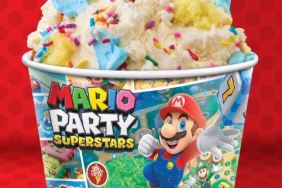If you take your thumb off of the 3DS’s Circle Pad and let Yoshi stand still, he’ll contentedly march in place as he awaits his next command. It’s part of his charm, really. A perhaps-misplaced sense of courage, rounded-off with exceptional loyalty, says (for the most part all) there is to say about the faithful little dinosaur’s character. Yoshi is selfless enough to give his life if it means Mario will complete a jump, yet somehow possesses the wit and foresight to scribble down notes explaining his whereabouts, and tack them to a post at his doorstep when needed. He’s basically the perfect fusion of your dog and your best friend; ever-reliable, and somehow sans the inevitable downsides of both. Perhaps it’s this impossible mix of cleverness and devotion, then, that makes Yoshi such a fantastic hero. He does what’s necessary and adapts to each new adventure, astute enough to reap satisfaction from his deeds, but far too oblivious to question them.
It seems almost like fate that it’d be Yoshi to deliver this game, on this system, at this junction in 2D platforming history. Yoshi’s New Island is technically the third entry in the Yoshi’s Island series, beginning with EAD’s original SNES classic, Artoon’s DS followup, and culminating now with Arzest’s fantastic effort on 3DS. Arzest is apparently comprised of former and key Artoon personnel, plus some presumably talented refugees from SEGA, so their success isn’t all that surprising. What is surprising, though, is their ability to transplant everything you loved about the original Yoshi’s Island, inundate it with an astounding number of entirely new ideas, and output a product that not only exceeds the cute love letter that everyone probably would have been fine with, but cements itself as an instant “new classic,” one that genre fans or game fans in general simply must play. It really is that good.
Perhaps the only area where Arzest doesn’t go the extra mile is story, but luckily the decision not to do so is nigh inconsequential. Baby Mario and Baby Luigi have been swiped once again by the Magikoopa Kamek, and when Baby Mario plummets down to Yoshi Island, it’s up to him and the dinosaur clan to traverse its many worlds and get Baby Luigi back. The difference? Well, the game makes a point to note that this is in fact a different island (one might even call it new), and secondly, there’s no evidence to suggest that the events of the previous games ever occurred at all. Much like Super Mario Galaxy 2, the plot of preceding games has been completely erased from memory, and for better or worse, this seems to be the trend with Nintendo’s prized platforming sub-franchises. It’s certainly fine by me.
Yoshi has always controlled differently than Mario, and immediately upon playing I was pleased to find his arsenal of signatures completely intact. The flutter jump, the converting of enemies to eggs, the ground pound — it’s all there, classic sound effects and Yoshi-isms included. As always, Yoshi takes a cue from Wario Land in that he’s largely invincible, instead losing hold of Baby Mario when he takes damage. The default time before Kamek’s minions swarm is ten seconds, but it can be increased by collecting miniature stars or reaching halfway points in levels. It’s a time-tested gameplay mechanic, and though it hasn’t been altered drastically, there’s still nothing quite as thrilling as snagging Baby Mario from off-screen with a fully outstretched tongue, pulling him back to safety as hovering minions sputter away, cursing your name.

Interestingly, such moments are few and far between. What you’ll instead be fixated on is the amount of charm and sheer content crammed into every last corner of the game. Partway through World 2, it occurred to me that I had quite literally encountered at least one new thing, be it an enemy, game mechanic, minigame, or something else, in every stage up to that point. I decided to keep track, and was astonished to see the trend continue, without exception, through to the final boss. When it really hit me was in World 4, when I encountered a Goomba for the first time. A Goomba. More than halfway through the game. Arzest hadn’t used them yet. Two levels later, I clobbered my first Bullet Bill, to the same effect. Beyond simply appearing, these classic baddies have been injected with new life. Bills can be gulped down for a quick egg, while Goombas can be squashed and literally ridden as they attempt to sidle away unsuspectingly. These are the type of quirks that make New Island sing.
And really, that’s Yoshi’s trump card. Once started, New Island never stops singing. I don’t recall a 2D platformer in recent memory that’s as dread-free as the jungles, tundras, and varied dreamscapes that the Yoshi clan calls home, and as I cleared stage after stage my hunger only increased. I wanted more. There was never a time when I closed my 3DS because I was too drained to take on a boss, nor did I ever doze off mid-session at the umpteenth filler level to match a humdrum overarching visual theme. Yoshi’s world is one built on discovery, never resorting to rote-memorization, cheap tricks, or fabricated “difficulty” to keep the player interested. Such devices are beneath it. Instead, it soaks its audience in a shower of ideas so refreshing and so well-implemented that you can’t help but loose an “aha” or “oh!” at least once per stage. The fact that most deaths result in a giggle fit rather than a hurled 3DS is a feat equally as impressive.
I had my reservations about Yoshi’s audio-visual offering, especially when you consider the mediocre track record of Nintendo’s “New” series of Mario games (“bah! bah!” backup vocals have become my worst nightmare), but I’m pleased to say that Yoshi’s New Island delivers exactly what you’d expect from the SNES days. Though the game’s soundtrack gets off to a slow start, by World 2 I realized I was actually quite enjoying it. Despite many of the tunes being essentially remixes of the same melody, the arrangements became so varied and involved by the end of the game that I liked a good handful of them more than the music of Yoshi’s Island itself. Bassoons, trombones, and even Yoshi squeals permeate the orchestration in such a way that it really bumps the production up a notch, and the effort its much appreciated. There’s one melodic line from the mini boss mid-castle theme that is so hip, I actually uttered an audible “woo!” the first time I heard it. Hollywood soundtrack this certainly isn’t, but on the whole, it’s quite the impressive accomplishment.
Visually, the game won’t be overheating your 3DS, but it faithfully recreates the look and feel of the original game in a polygonal context. This is more impressive than it sounds — modern Nintendo sidescrollers have suffered an unfortunate sterilization, permeating not just New Super Mario Bros, but even the likes of Kirby and (in my opinion) Donkey Kong Country. The fact that New Island not only bucks this trend, but actually manages to look better than its sprite-based predecessors is a neat trick indeed. Colors pop, brush strokes careen and swirl, and each level alters its palette just enough, however subtly, to differentiate it from the last. Super Mario 3D World is still gorgeous, but Nintendo’s secondary teams should really take note of what Arzest has done.
When the end credits for Yoshi’s New Island rolled, I felt satisfied, but couldn’t help but think that for Yoshi’s next adventure his memory will likely be wiped, and he’ll march in place once more, blissfully prepared to do the whole thing again. Thankfully, there are new generations of gamers who will be experiencing Yoshi’s Island for the first time, and their eagerness is likely the only thing that can outmatch that of Yoshi himself. If you’ve experienced Yoshi’s Island before, New Island is a wonderfully outstanding sequel. And if you’re trying the series for the first time, well, you’re really going to like what you play.

Griffin Vacheron is a Writer for CraveOnline. You can follow him on Twitter @novacav.
3DS copy provided by publisher. Yoshi’s New Island is exclusive to 3DS.








